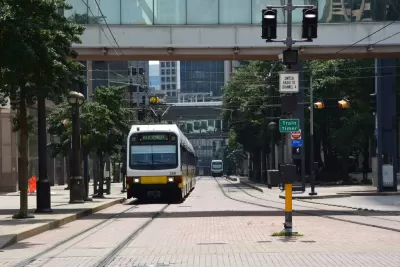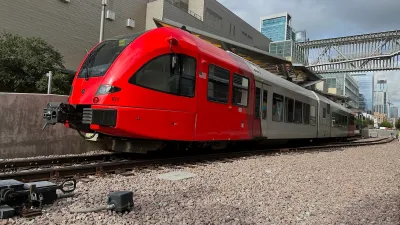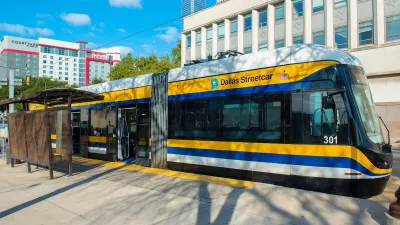Researchers at the University of Texas at Arlington have produced a scathing report on the inadequacies of public transit in Dallas.

Peter Simek reports on a new report released by researchers from the University of Texas at Arlington’s Institute of Urban Studies that "comprehensively reveals the failures of Dallas Area Rapid Transit to provide adequate public transit to its member cities."
"The analysis exposes a failure that is contributing greatly to lingering issues of poverty, inequality, and a lack of upward mobility in the region."
Among the key statistics in the report presented at the October 23 meeting [pdf] of the Dallas City Council's Mobility Solutions, Infrastructure and Sustainability committee:
- "More than 65 percent of residents who are dependent on transit have access to less than 4 percent of regional jobs."
- "On average, just 18 to 22 percent of the population has access to high frequency service during morning and afternoon peak hours; but during off peak hours, that number drops to just 9 percent of the population."
- "About a third of Dallas residents and transit-dependent residents do not have walking access to a transit station."
Simek pulls no punches in summarizing a deeply critical indictment of the Dallas Area Rapid Transit system: "In one fell swoop, the report illustrates how Dallas’ income inequality and lack of upward mobility are directly related to the failures of its public transit agency."
FULL STORY: Bombshell Report Reveals DART’s System-Wide Inadequacy

Study: Maui’s Plan to Convert Vacation Rentals to Long-Term Housing Could Cause Nearly $1 Billion Economic Loss
The plan would reduce visitor accommodation by 25,% resulting in 1,900 jobs lost.

North Texas Transit Leaders Tout Benefits of TOD for Growing Region
At a summit focused on transit-oriented development, policymakers discussed how North Texas’ expanded light rail system can serve as a tool for economic growth.

Why Should We Subsidize Public Transportation?
Many public transit agencies face financial stress due to rising costs, declining fare revenue, and declining subsidies. Transit advocates must provide a strong business case for increasing public transit funding.

How to Make US Trains Faster
Changes to boarding platforms and a switch to electric trains could improve U.S. passenger rail service without the added cost of high-speed rail.

Columbia’s Revitalized ‘Loop’ Is a Hub for Local Entrepreneurs
A focus on small businesses is helping a commercial corridor in Columbia, Missouri thrive.

Invasive Insect Threatens Minnesota’s Ash Forests
The Emerald Ash Borer is a rapidly spreading invasive pest threatening Minnesota’s ash trees, and homeowners are encouraged to plant diverse replacement species, avoid moving ash firewood, and monitor for signs of infestation.
Urban Design for Planners 1: Software Tools
This six-course series explores essential urban design concepts using open source software and equips planners with the tools they need to participate fully in the urban design process.
Planning for Universal Design
Learn the tools for implementing Universal Design in planning regulations.
Ascent Environmental
Borough of Carlisle
Institute for Housing and Urban Development Studies (IHS)
City of Grandview
Harvard GSD Executive Education
Toledo-Lucas County Plan Commissions
Salt Lake City
NYU Wagner Graduate School of Public Service




























